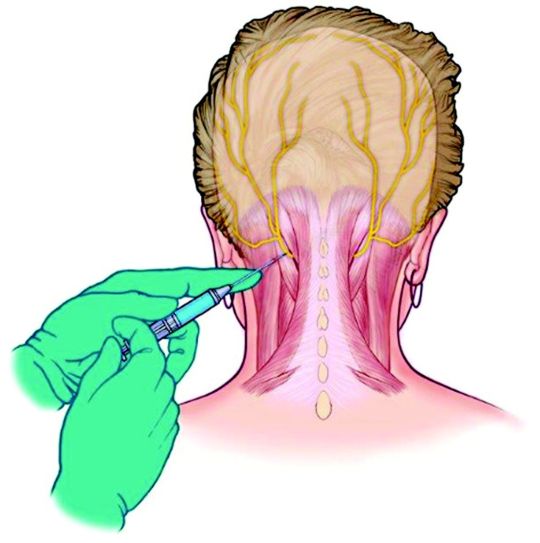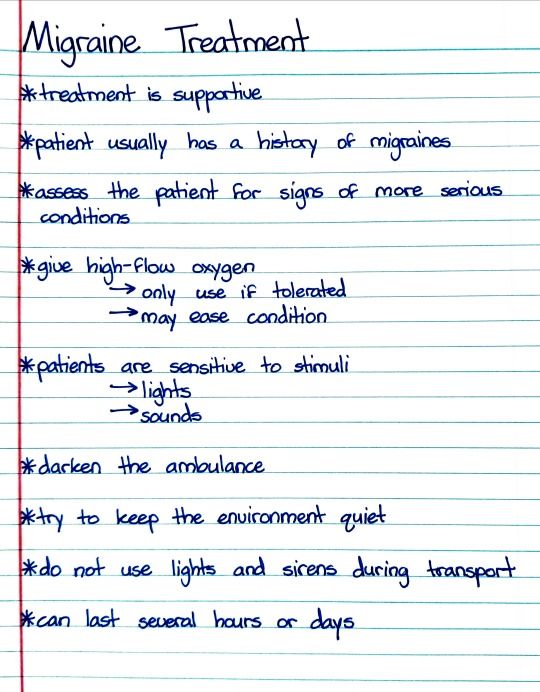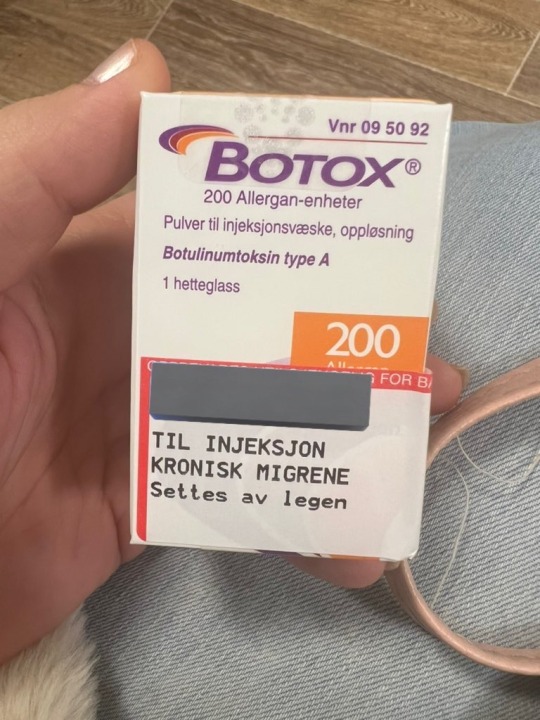#migraine treatment
Text
headache tips <3
i have really bad migraines, so random headache tips for those who need them ->
take ibuprofen instead of advil or acetaminophen
if your headaches are caused by allergy, take cetirizine
tie a scarf or ribbon around your head tightly
if you wear glasses and can see reasonably well without them, take them off for a bit
drink lots of water!!! (warm water > cold water)
try to avoid eating as long as you have a headache, but light foods like fruit are okay
don't tie your hair up very tight, leave it out or braided
take a nap if you can
i hope you feel better soon <3
#divine feminine#girlblogging#whisper girl#girlhood#it girl#coquette#gaslight gatekeep girlboss#lana del rey#hijabi#born to die#black swan#audrey hepburn#girl interupted syndrome#girl interrupted#female manipulator#manic pixie dream girl#this is what makes us girls#cinnamon girl#hijabi coquette#girl blogger#it girl motivation#motivation#headache#health tips#dark femininity#dollette#migraine treatment
29 notes
·
View notes
Text
Started on a new anti-migraine drug today (ajovy). Also have had terrible sleep - Especially today, but, like, all year. Also, y'know the migraines.
So not 100% sure if certain things are side-effects of the ajovy or just y'know, my body being upset with many things going on in its life - But more to the point: Should I be concerned with anything that I'm seeing/experiencing?.
Trying to google side-effects is sure a fucking trip, though.
Official company line on their site seems to be "Some swelling/irritation near injection site" is likely the only side-effect confirmed to definitely be from this medicine. Anything else? Well, that must be someone else's problem.
Various reddit posts of peoples' experiences with the medication - Mostly neutral-to-mildly positive. A lot of not-outright-negativity, but disappointment or frustration about the tradeoffs vs benefits. But the side-effects definitely vary wildly in type and intensity. The ones I'm curious about are topics of discussion that have come up with some degree of frequency.
Various interaction/drug rundown sites have much more comprehensive lists, but also include a warning that the ones I'm looking into may be serious/concerning and I should consult my doctor about them right away. Which, like, doesn't seem to be the tone regarding them anywhere else. So, more confusion as-to who's out of step here.
Meanwhile, the pamphlet that came in its box actually does have a more comprehensive list of possible side-effects. Doesn't list severity other than obvious "If experiencing anaphylaxis..." or other obvious emergencies/serious stuff, then go to ER/phone doctor immediately. Everything else listed is just sort of "This could happen" without any level of how concerned you should be.
The ones I've noticed are heartburn (Unusual for me without certain types and timings of trigger-foods, but not impossible to be something else going on that's unrelated to this). And notable joint-stiffness (hands and feet, especially on the same side as my injection), with a touch of joint pain. Both of those are in the "might happen in ~1% of patients" group. Which, hey, alright. That's fine. They're known to have a connection, echoing what the reddit posts were saying. From the tone in the pamphlet and on reddit, I probably don't need to be concerned unless they worsen or persist for a very long time.
Uncommon doesn't necessarily mean alarming, though I am curious as to if there's any correlation in the group of people that experience them. Any factor that might predict it, or explain why they're causing this reaction, y'know?
Okay. Good. No need to panic. Probably should sleep though. Less than 4 hours in the last 48 can't be good for me.
#rambling#migraine treatment#why is finding straightforward information on treatments and side-effects so tricky?#I guess this type of medication is relatively new as far as medicine classes go#but like they had to have been researching it for years by now#I wonder if the lack of clarity in official materials about side-effects reported as somewhat more common can be chalked up to trials#and how they - By design - Try to minimize complicating factors#so if patients are selected#rather than just blind trials#they probably don't have a ton of co-morbid conditions going on that could complicate trials#and render results ambiguous
4 notes
·
View notes
Text

Today's look, big shades for going to get Botox migraine treatment shots. I'm so so grateful for my big shades.
Just had the weirdest disconnected feeling when we stopped to stretch our legs on the drive, like my head wasn't connected to my body at all. Long drives for medical treatment with a migraine are always exciting.
11 notes
·
View notes
Text
Migraine isn’t a Headache Part Six: make it stop
We looked at medication and treatment for acute attacks of migraines. Things that you can do to treat the pain when you're having it.
This is also probably the first line of help you'll get from a GP or pharmacist or whoever you approach for help.
Some people have success with acute treatments. Maybe the migraine was a one-off, or is a rare occurrence, maybe it was just really responsive to acute meds.
Some people have migraines that don't respond to acute meds, or don't respond well enough to be considered effective treatment.
When you get to this stage, you need to start looking at stopping the migraines before they start, instead of constantly taking acute meds that a) don't work and b) can cause rebound headaches and other problems.
It sucks, because you want to reach for the painkillers when you have pain, but doing so is not sustainable.
Getting into preventative meds ties in a lot with how you go about getting a diagnosis, but I'm going to try to speak about the meds and complimentary treatments AROUND being under a neurologist. On that note, GPs are rarely going to work with you on preventative meds.
There are a few they can prescribe, but you'll probably get better treatment under a neurologist or headache specialist. Sorry.
GPs are useless.
Sorry, bit of my bias there, but I don't use GP's unless I need a referral or quick acute treatment, and EVEN THEN.
It's worth noting as well that you'll usually only get to this stage if your migraines have become chronic, that is:
for over 3 months
you've had 15 headache days a month minimum
of which 8 have migraine features
Some of the treatments aren't indicated for episodic migraines.
((As previously mentioned, this definition might be changing to take into account the impact migraines are having on your life, and not a somewhat arbitrary number; fingers crossed this happens soon))
My list of attempted treatments includes:
amitriptyline (this is one the GP might prescribe for you) (also prescribed for abdominal discomfort and major depressive disorder, although it's fallen out of favour due to increased risk of fatality in overdose)
propranalol (and this) - beta blocker
flunarizine (calcium channel blocker, used to treat high blood pressure and certain heart conditions)
lamotrigine (usually prescribed for epilepsy and bipolar disorder)
topiramate (usually prescribed for seizures)
candesartan (usually prescribed for hypertension)
pregabalin (usually prescribed for seizures and anxiety)
gabapentin (usually prescribed as an anticonvulsant and for nerve pain)
Botox injections
greater occipital nerve blocks
Magnesium/CoenzymeQ10/Vitamin B trio
Aimovig (erenumab, CGRP injection, one of the first migraine-only treatments)
Ajovy (fremanezumab, another CGRP injection, one of the first migraine-only treatments)
sTMS machine (single pulse transcranial magnetic stimulation)
Vyepti (eptinezumab-jjmr IV infusion, another CGRP drug)
I don't think I've had EVERY drug available for migraine prophylaxis, but judging by the increasingly surrendering tone of the letters from my neurologist, I'm just about there.
As you can see, apart from the last CGRP drugs, almost every drug listed is used off licence for migraines, and none of them were developed to treat migraine at all.
You can group most of these drugs into treatment for blood pressure, epilepsy and mental health issues.
The idea that migraines are mainly caused by blood pressure has kind of aged out with advances in research, but the fact remains that some medication that acts on blood pressure still helps migraines.
I think, bearing in mind that a migraine is a neurological storm, that it makes sense that meds that act on activity in the brain (mental health meds/epilepsy meds) can help migraine. Makes logical sense, right?
The usual procedure for taking these medications for migraine (at least in the UK) is to titrate up to the correct dose, and then (assuming you tolerate it and don't get floored by adverse reactions or the side effects) remain on that dose for 3 months before concluding if the medication is successful or not.
If you're seeing some improvement but not a lot, they might keep you on it for longer, or increase the dose.
Otherwise, 3 months and no improvement means you move onto the next drug and/or treatment.
A lot of these drugs have some really heavy side effects. I've experienced worsened tremors, awful dizziness, change in sense of taste, changes in appetite, terrible brain fog.
For migraineurs it comes down to a balancing act.
How bad are the side effects vs how much is this med helping my migraines, and which of the two am I best able to handle.
Maybe you can manage dizziness or not being able to drink Coke anymore over the migraines.
Maybe the awful tremors and inability to think clearly is worse than bearing with the migraines.
This is usually something you discuss with your specialist.
Just saying again, some of these meds are a little hardcore. Don't try treating your own migraines on your own with these meds if you can get your hands on them somehow. Apart from the side effects, the dose if really important too.
In the UK, if you've failed at least three preventative treatments, and have been managed for medication overuse headaches, you can try botox.
BOTOX
The reason botox works for migraines isn't well known, but doctors think it blocks pain transmitters in your brain.
Botox, or botulinum toxin, is a nerve toxin that paralyses muscles.
It's used for cosmetics treatments, but also medically for hemifacial spasm, cervical dystonia, cerebral palsy, bladder pain, lower back pain, neuropathic pain and stroke.
When used for migraine, it's delivered in a series of 31 to 39 small injections, mostly around the forehead, but also on the temples and at the base of the skull.
If you've ever had acupuncture, the needles are a lot like that. I thought they'd hurt more than they did. They were just little stings, not even as bad as plucking an eyebrow hair. Of course, everyone's different with different pain thresholds (especially if you're oversensitised migraine pain leaves you with allodynia) but it's truly not that bad.
You get three sessions 12 weeks apart, just like taking the meds, and if you've had improvement you can continue. If you don't, its on to the next med or treatment.
It feels weird when it settles in. Your forehead tends to freeze, so you can raise your eyebrows and have no lines there. This might unsettle some people, but it does wear off over time.
Side effects include neck pain, muscular weakness and a drooping eyelid, but these improve as the botox wears off. I had a little neck pain, but nothing else. One of them in my forehead bled only a little, none of the rest did.
You can have an allergic reaction, but they will keep you in the treatment or waiting room for some time after your first treatment to check that.
Getting botox for migraine sounds worse than the experience is, but it is about 75% successful for reducing migraine.
Not for meeee
GREATER OCCIPITAL NERVE BLOCKS (GONB)
If your migraines have been resistant to drug treatments and botox, your specialist might decide to try GONB. This is usually a treatment for cluster headache or headaches that originate from pain in the neck, so it may not be applicable to your specific situation.
This treatment involves injecting an anesthetic and a steroid (not always both) into the back of your head/top of your neck around the greater occipital nerve (GON).

The GON runs from the top of the spine to the scalp, and feeds into an area of the brainstem called the trigeminal nucleus.
A nerve block reduces traffic in this nerve, so reduces the amplification of pain and other sensory information that might be overloading this area.
In simple terms, the nerve block stops the pain signals going into the nerves that make you feel the headache.
A lot of people have had success with this treatment, but I'm not one of them.
I don't want to scare anyone!
The reaction I had is (apparently) pretty rare.
After the neurologist injected the first lot of lidocaine into one side of my head, then the other, I almost immediately felt dizzy and sick.
He let me lay down for a moment, but I felt that I was going to puke, so I had to get up. What followed was tunnel vision, greying out, nearly full syncope (fainting) and then vomiting.
I was having a reaction to the lidocaine, which suddenly made my nausea and faintness when I had my lumbar punction (spinal tap) make sense.
I wasn't able to get to the stage where I had the steroid injection, and whatever there was of the anesthetic after my body tried to purge it made no change to my migraines.
I can't speak for the efficacy of the GONB because my body failed it, but if it's offered, I'd encourage you to try it. Apparently it has helped a lot of people.
CGRPs
After trying 3 meds, then botox, then the GONB and failing all of them, I was put on the next med to see if I'd respond to any of them.
You don't need to have exhausted every pill before trying injection treatments.
You can also mix and match treatments, especially a pill or a CGRP with botox.
With the knowledge that you spend a minimum of 3 months per med (and assuming you don't come off it immediately due to adverse reactions) you can only go through 4 meds in one year. It takes two years on this schedule to go through the meds I've worked through, not including the botox and GONB, and the extra time taken to titrate to the correct dose.
Finding a medication that works to prevent your migraines is a long and exhausting process.
Thankfully, recent research into migraine has come out with the biggest breakthrough in migraine management, I'm going to say ever, because we now have the first medication created directly for the prevention of migraines.
CGRP stands for Calcitonin Gene-Related Peptide
It's a chemical involved in transmitting pain signals through the nervous system – and it’s also associated with the triggering of migraine attacks (among others).
CGRP medications are actually ANTI-CGRP drugs, designed to stop the action of the chemical.
The ones currently available in the UK fall into two groups.
Aimovig (erenumab) that works by binding to the receptor.
Ajoy (fremanezumab), Emgality (galcanezumab) and Vyepti (eptinezumab) which bind to the protein.
Because of that, if you don't have success with Aimovig, try one of the others (and vice versa) as you might see some improvement.
These are adminstered by self-injection (although the first one will be done under nurse supervision) every month with something like an epipen that's injected into your thigh.
The injections hurt me and ached afterwards, but I had no other side effects than that.
I actually had one migraine day where my pain was a 3, which hadn't happened since I started having migraines, but unfortunately, NHS guidelines state that you need to have a reduction in pain days or a significiant reduction in pain in order to stay on them, so I was taken off.
We've just had Vyepti (eptinezumab-jjmr) approved for some people with migraine in the UK.
Vyepti is a CGRP administered via IV infusion over 30 minutes at a clinic, and it's still such a new drug that they're still collecting information on side effects, etc.
I've had my first dose (they're given every 3 months) and while I didn't see a reduction in pain days, I saw maybe a slight reduction in pain, but more than that, my brain fog and pain cloudiness really cleared up, at least for the first month and a half that the effect lasted.
I was actually present in my body for once, instead of half-checked out, even if I was still in pain.
I don't know what the review will bring, but I hope they let me stay on it.
In the US, they've also got a new group of drugs called -gepants (Ubrogepant, Atogepant and Rimegepant for now) which are being used preventatively, but also like triptans, acutely.
Like the injections, they also work on the CGRP receptors by blocking their effect.
I don't know very much about them, but they're also some of the first drugs made specifically for migraine, and there's a lot of excitement about them.
They're safer than triptans for people with heart issues to take, and they DON'T CAUSE REBOUND HEADACHES!
This is huge in the world of migraine treatment, as there are no other acute treatments that do this.
NON MEDICINAL
A large chunk of preventative non-medicinal treatments for migraine involve making lifestyle changes (I know)
The migraine brain is oversensitive and overreactive creature, and ANYTHING can push it into a tantrum. Weather changes, temperature changes, lights, sounds, smells, so many things that we can't control in our environment.
Our migraine brains love routine, and even though it's annoying and removes some chunk of flexibility in our lives, it annoyingly does help.
Sleep routines are helpful, as much as you can fit yourself into one. Setting sleep and wake alarms with x amount of hours in between (7 or 8?) and then sticking to them rigidly means that you'll be getting up when you're still sleepy and going to bed when you're not, but your body will eventually fall into a rhythm and you'll find yourself sleeping and waking at those times automatically.
Issues: daytime naps are no good for sleep routines, and sometimes you just HAVE to sleep when a migraine hits. What if you want to stay up on the weekend? It's difficult, but keeping to a schedule as much as possible is better than leaving it in the wind.
Eating regularly, small meals often is the best. I'm not going to spend a lot of time on this because diet is a huge and sensitive subject, and comorbidities can make this even more difficult, but as far as migraines on their own are concerned, they like the body to be kept as stable as possible, which means a level blood sugar level, etc, and avoiding hunger.
Exercise? I know, I'm not going there, apart from, gentle stretches for your neck, maybe your back, can help. Even if neck problems have nothing to do with your migraines, you're going to end up all crunched up and tense from being in constant pain. Look at stretches for post-operative, for the elderly, for anything you can do in bed. It doesn't have to be high impact or intense, just something you can do now and again to keep your muscles loose.
H~y~d~r~a~t~i~o~n. I'd say use a pretty bottle, but honestly, using whatever will make it easier for you to fill and keep drinking from is better than something that fits your aesthetic. You can always decorate a plastic bottle, or use a favourite glass.
Apart from all those irritating things that abled people always recommend (yoga anyone?) there are also non-drug but prescribed treatments.
One category is DEVICES
I've only tried the sTMS device, so I'll address that first.
sTMS stands for single pulse transcranial magnetic stimulation
You press the button to charge the thing. When it beeps you place the bean-shaped device at the back of your head so it cradles your skull, and then press both buttons at the same time.
There's a ka-chonk, and a sensation like someone's smacked you in the back of the head a little, which is actually the small magnetic pulse.
It works by generating mild electrical currents in the brain that are supposed to disrupt the brain activity linked to your migraines. You can use it acutely, but also daily (2 or 3 times a day, 1 or more than 1 pulse at a time) to prevent migraines.
The machine didn't do anything for me, and made my scalp feel a little sore, although that doesn't appear to be common.
You may also have heard of the Cefaly, a device otherwise called a 'external trigeminal nerve stimulator'
There's that trigeminal nerve again, running around the side of your face and your eye, playing up and causing pain.
You place an electrode on your forehead, and the Cefaly generates micro-impulses to stimulate the trigeminal nerve's nerve endings.
Be aware that the efficacy of the Cefaly device is debated, but it does help some people.
ACUPUNCTURE has been used to help migraine
I had many courses via my GP (the only good one I had) who was trained in acupuncture and went above and beyond to give me as many treatments as possible. I think I had 12. I felt something from them, but they didn't have any effect on my migraines.
Finally, not a drug per se, but VITAMIN SUPPLEMENTS
The best are a trio as follows:
Riboflavin 400mg once daily
Co-enzyme Q10 100mg three times a day
and Magnesium (there are two/three types and the doses are different)
Citrate 600mg OD
Tricylicate 250mg twice a day
or Phosphate 400mg once daily
There is also therapy that is prescribed for management of migraine, not so much prevention as just giving you tools to learn to live with being in pain.
I haven't gotten to that stage yet, and have mixed feelings about it.
Some people have said it's helped, some said it hasn't.
It -feels- a lot like being told 'we can't do anything to help you, you just have to deal with being in pain now'
I haven't tried it, I probably will end up doing so, and maybe I can write a little about it then. For now, I can see why it could be useful, but it does feel a little bit like being abandoned.
And that's all I've got for preventative treatments.
I don't know when I'll be able to start writing about my diagnosis journey, but that should be the next part.
please excuse any typos!
i hope this is still helpful for some people.
#migraine isn't a headache#migraine#disability pride month#migraine awareness#chronic pain#spoonies#headache#preventative meds#migraine medication#migraine treatment
8 notes
·
View notes
Note
.....thought for a second you meant you were starting T. important bit of the post in the tags, there
anyway. gl, hope the stuff works o7
i haven't gone through asks in so long that for a split second i forgot what this was referring to. moment of "wait did i start t?"
11 notes
·
View notes
Photo

#studyblr#notes#medblr#medical notes#med notes#emergency medicine#emergency medicine notes#ems#ems notes#emt#emt notes#emergency medical technician#paramedic#migraines#headaches#migraine treatment#treatment of migraines
25 notes
·
View notes
Text


35 shots later 💉🤠
#and if I say it feels oddly good what then#like when it hits the worst spots… and the cold injections hits#mmmm#irl tag#Botox#chronic migraine#migraine#migraine treatment#selfie#selfie tag#personal
16 notes
·
View notes
Text
Migraine Cure Herbal Migrokill Capsule
Suffering from intense migraines? Migrokill! Headache & Migraine Relief brings relief fast. Combining healthy vitamins and minerals in a potent formula with clinically-researched herbal ingredients, Migrokill tackles the root cause of head pain instead of just masking the symptoms. The result is powerful relief that lasts. MIGROKILL Herbal Capsule is the first dietary supplement that assists in the nutritional status of Migraine sufferers. Research shows that Migraine frequency and duration can be related to nutritional status, among other factors. MigroKillprovides a new, “Triple Therapy” approach that combines 3 dietary ingredients, each of which has been shown to be strongly associated with dietary issues linked to Migraine sufferers. Our top recommendation for addressing the issues of migraine is a product called Migrokill. This product is formulated using all natural ingredients. Migrokill is a dual-action herbal supplement, designed to address the root cause of migraine and the associated symptoms.Migraines are mostly caused by either a hormonal imbalance, nervous system stress, or both. You can use Migrokill to get rid of symptoms, to prevent them from occurring, and to stop them from coming back.Migrokill is manufactured in a cGMP Certified laboratory in India and is continually being tested by third party organizations to ensure that it is safe for consumption.Most headache remedies focus on the surface level, but do nothing to treat the underlying causes of migraines and tension headaches. As a result, they do little more than mask the symptoms. Migrokill capsule is different. Our supplement is formulated to bring your body back into balance for lasting relief.Don’t wait any longer, make your decision now – order Migrokill capsule and free from migraine forever.
For further details on Migrokillcontact us at +91- 9690666166 or email us at [email protected]
0 notes
Text
https://rnrtreatment.com/tms-treatment/chronic-pain/tms-treatment-doctors-for-migraine-in-mumbai
Doctors for Headache Treatment in Mumbai
Jaslok Hospital has doctor for headache treatment in mumbai which offers comprehensive evaluation and treatment services for various types of headaches, including migraine. The clinic's team of experienced neurologists and headache specialists uses advanced diagnostic techniques and personalized treatment plans tailored to each patient's specific needs and symptoms. Jaslok Hospital has the best headache best doctors in Mumbai Our team of experienced head specialists provide comprehensive care for patients suffering. For more information Visit our website https://rnrtreatment.com/tms-treatment/chronic-pain/tms-treatment-doctors-for-migraine-in-mumbai
0 notes
Text
Book An Appointment For Consultation | +91-7411955955 | +91-7411055955 | +91-9036619944 | 080-41241822|
0 notes
Text
Are Migraines the Complex Neurological Conditions?
They are complex neurological conditions characterized by recurrent moderate to severe headaches often accompanied by other symptoms such as nausea, vomiting, and sensitivity to light and sound.
In other words, you can say migraine is a type of headache disorder characterized by recurrent episodes of moderate to severe head pain often accompanied by other symptoms.
#migraine relief#headaches#migraine#headache#migraine headaches#migraine treatment#usa#health#fioricet#medication
0 notes
Text
#migraine relief#N29 Migronip Drops#natural headache solution#health and wellness#migraine treatment#headache relief#migraine prevention#natural remedies#wellness tips
0 notes
Text
2 notes
·
View notes
Text
I say a lot of crap about GP's on this blog because of the many, many, MANY bad experiences I've had with them (shout out to the one good doctor I had before I moved, who I love and miss very much)
I find I get better treatment when I get past the GP to the specialists, some of the time, but I get the feeling that they're happy to see you, but immediately lose interest if your issue isn't shown in tests and/or something with an easy fix. The postcare isn't very good, is what I'm getting at.
My neuro team are fantastic. They can't respond to my emails very quickly because they're critically overworked, but I feel like they really actually care. They even remember me. I mean...
Anyway!
I had my Vyepti treatment a few months ago and had a call about where we go from here.
I haven't had a reduction in migraine days, still getting one every day, but my medication use dropped by half (!) and the severity went from an average of 8 to an average of 6
That's a HUGE improvement for me, and one I've never had from any other treatment so far. The effect is truly massive.
I don't meet the NICE criteria for a second dose, because I haven't had a reduction in my headache days, or a significant enough drop in severity ;_;
HOWEVER, my headache nurse is going to fight for me to get a second dose.
Nothing has worked as well for me in 8 years, I mean.
If she's successful, I might be getting another dose in August, otherwise...?
((We also discussed if the way autoimmune autonomic ganglionopathy works might be why I don't respond to any treatments, but she couldn't answer that. If my neuro is around when I go down for my treatment, she said I could discuss it with him ))
All over, I'm feeling optimistic!
4 notes
·
View notes